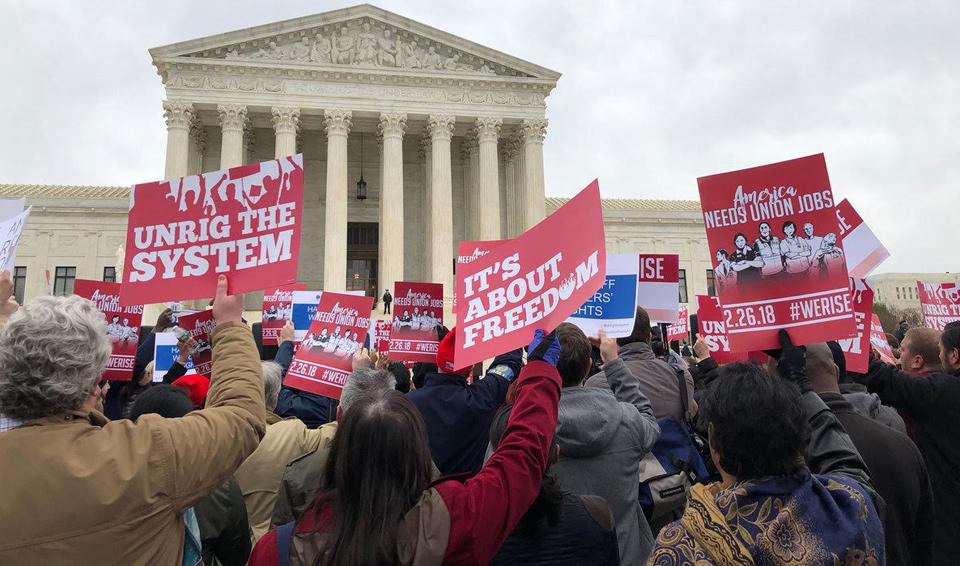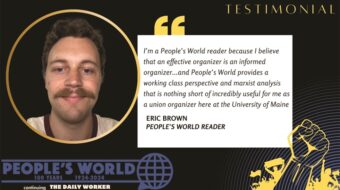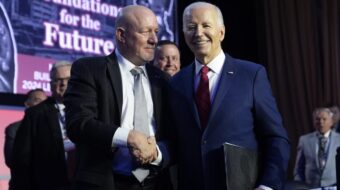
WASHINGTON—“Agency fees,” paid by non-union public workers whom unions represent in many states, hit the U.S. Supreme Court on Feb. 26. But what was really at stake is the future of the union movement.
“You’re basically arguing, ‘Do away with unions,’” Justice Sonia Sotomayor told the attorney for the union foes who brought the case, William Messenger of the National Right to Work Legal Defense Fund.
Messenger ducked a reply to her statement, the final one in the court’s oral argument on Janus v AFSCME District Council 31.
As the justices heard the case inside the court’s white-marbled hall, unionists made themselves heard outside. More than 1,000 demonstrated for worker rights on the plaza outside the building. And they drew support from pro-choice, civil rights and community allies. A much smaller group supported the Right to Work crowd.
The case is the most important labor case to hit the High Court in decades, said attorneys for both the union and the state of Illinois, whose law lets AFSCME collect the agency fees from the non-members.
That’s because state and local government workers – nurses, fire fighters, teachers, police, EMTs, city sanitation workers and more – total 6.24 million (42 percent) of all unionists nationwide. Those unions also represent 576,000 non-member state and local workers.
Some of those non-members pay agency fees. The others, in right to work states, are “free riders.” A decision for Mark Janus and the right-to-work crowd would automatically make all 6.8 million state and local government workers “free riders.”
“You do realize the resources” for the unions “would be substantially diminished” if his side wins, Justice Ruth Bader Ginsburg told Messenger. “The 1st Amendment means that’s a perfectly acceptable result,” the lawyer replied.
Janus and two other dissident Illinois workers, recruited by the Right to Work crowd, argue that everything any public worker union does is “political.” Thus, forcing them even to pay for just the basics of collective bargaining and enforcing contracts violates their free speech rights and is unconstitutional.
Illinois Solicitor General David Franklin and AFSCME counsel David Frederick countered by arguing there is no constitutional issue involved. In bargaining and handling grievances, the state is acting as an employer, Franklin said, not as a political entity that can determine what its workers can say, or not say, on the job.
“The state’s interest here is dealing with a single spokesman, and that they” – the union – “have a duty of representing everyone,” Franklin told Justice Elena Kagan. That includes the non-members, he added.
“A two-tiered workplace” where some people pay dues and the rest are free riders “would be corrosive to collaboration and cooperation,” he added. And, to keep their members, unions might be forced to become more militant, including demanding the right to strike.
Making all state and local government workers free riders, “drains the union of resources that make it an equal partner” in bargaining with the state and local employers, Justice Ginsburg re-emphasized.
“If you are right,” she told Messenger, “it’s not only the people who are opposed to the union, but union supporters who may think ‘I’d rather keep the money in my own pocket’ and then you’ll have a union with diminished resources, not able to investigate what it should demand at the bargaining table, not equal to the employer that it faces.”
Messenger ducked her question. When Ginsburg repeated it, he claimed the impact was “immaterial.”
Trump administration Solicitor General Noel Francisco, the government’s top lawyer, also spoke for the right-to-work crowd. That reversed the federal government’s prior stand – a reversal, along with others, that Sotomayor noted.
Justices Samuel Alito and Anthony Kennedy also came down on the side of the right-to-work crowd. Kennedy, for example, reeled off a list of issues he said public sector unions are involved in, starting with raising taxes. And Alito suggested that even grievances are free-speech issues to be subject to the court’s “strict scrutiny” for constitutional violations.
The union “can be a partner with you in advocating for a greater size workforce, against privatization, for teacher tenure, for higher wages, for massive government, for increasing bonded indebtedness, for increasing taxes?” Kennedy asked Franklin. “That’s an interest the state has?”
“No. The state has no overriding interest” in those issues at the bargaining table, Franklin replied. Kennedy remained unconvinced. All those are public policy issues where forcing Janus to pay even an agency fee “is compelled subsidization” of a view he dislikes, the justice said.
The two silent GOP justices were Clarence Thomas and Neil Gorsuch, the court’s newest member, named by Trump, whose lower-court rulings and writings were consistently anti-worker. That lineup has led court specialists to predict unions will lose the case 5-4 on party lines.
The court will decide Janus by late June. A transcript of the oral argument has been posted on the court’s website.












Comments